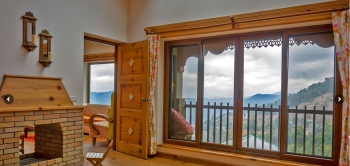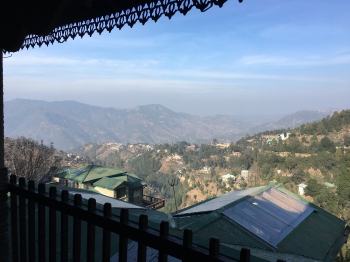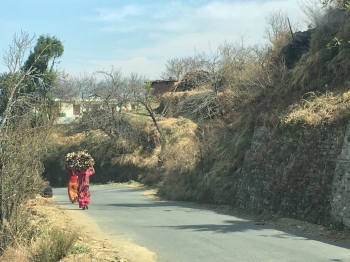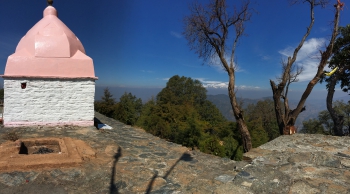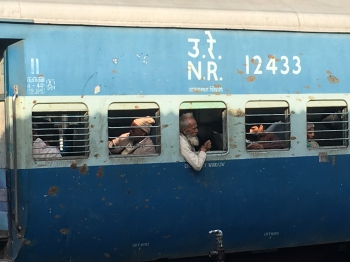04/24/2017
In the name of the Father, Mother-in-law and King-child: Parenting in India (seen by a Foreigner)
I was asked to talk about ‘parenting in India’. Quite a broad topic! I thought about if for several weeks, about what I have witnessed in the society I know and hoping not to write too many non-senses – which is a difficult task because in India for everything you say, the opposite is almost always true also...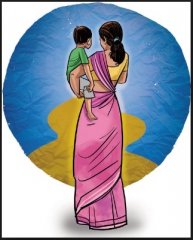
I have already written quite a lot about the experience of having a baby in India (1). In short, at the beginning, there is the mother-in-law, often present at birth, and she is often the first one to hold the newborn (before the mother this is true). Then the sister-in-law has to carry out a ritual – clean the mother’s nipples to purify them and give to the newborn a mixture made of honey (jatakarma) so he grows up all sweet with a sweet tooth – before breastfeeding can be initiated. The tone is thus set from the beginning: ‘parenting’ in India is more about ‘familying’, it is the job of about everyone in the family, if not especially the mother-in-law ( ;) ), which can upset the Western sensibility of a responsible mother who has her own views on what she wants or does not want for her child. Especially if she married to an Indian, and must comply with the rites like the naming ceremony or the head shaving (2).
The Indian son brought up, in the tradition, to never leave the family abode, his parents; in this sense he is and will always remain a ‘king boy’ all his life, kept away from any household chore – which makes guys who don’t even know not what a papaya looks like other than than in pieces on their plate, imagine. That’s the job of the women of the house: the mother, in whose petticoats he will always be hanging on except for a few misdemeanors to his wife’s, and then the latter. The Indian girl is brought up to be a good (obedient) daughter-in-law (maid) and especially a mother (she will only achieve her reason of being and earn her right to be on this Earth when she will give birth and this is apparently why we find in India the oldest primiparous women (3)); She will most likely leave her home for her husband’s and there is a good chance that she will not be able to work, even if she has done good studies (it is changing, but at a snail pace). She is taught to respect, obey, renounce being herself and especially swallow her feelings. If unfortunately a tragedy like a miscarriage happens, she is told that “there is no point crying, she should just forget and move on”. Mourning, letting her emotions flow? But this is madness! It is put a bit abruptly but it is quite like that.
Let us get back to the notion of ‘king boy’. French parents love their children, but they also try to limit the disruption their arrival means, in other words to not sacrifice their (entire) lives to their kids. For example the couple’s ‘intimacy’ is given a lot of importance and guides the sleeping organization. Which Westerner (except for the hipsters who are bringing back ‘co-sleeping’  into fashion) would not be horrified by the mere idea that children sleep with their parents? And up to 4 years at least! I remember being shocked when I could not find a child’s room (to sleep or play) in my Indian colleague’s apartment which yet had to bedrooms. In India, children not only sleep in the same bed as their parents, but also at the same time. Talk of ‘food and sleep schedule’ or ‘sleep training’ and they look at you like a monster. Here children live to the rhythm of the household from their very first few hours and immediately the world starts spinning around them. It is very cultural: the couple has very little importance in India, lost in the more comprehensive concept of family (in-laws, children, cousins, all must live in harmony, and the couple (which is anyway in general made of reason and not love) must make all the efforts to make it happen). In most Western societies, the couple is the foundation, and we even conceive that the children’s well-being could depend on the happiness of the parental couple - in our individualistic Western world, happiness comes from the realization of the self, in India by doing your duty, and ALL the difference comes from here. The latter are not ashamed to go on a holiday without their little one. And no Indian person would even think of it (also because the notion of ‘holidays’ is fairly new and is generally limited to visit the family and not to laze on a beach or hike in the mountains (unless there is a temple to see)). Indians also bring very young kids to the (adult) movies, to shows where mythological monsters scare the shit of me, or even to bars. And to conclude, in India, we don't let kids cry, it’s a sin. Some say it would be beneficial to let youngsters express their feelings, anger or sadness, but I guess it just creates too much distress for the family here.
into fashion) would not be horrified by the mere idea that children sleep with their parents? And up to 4 years at least! I remember being shocked when I could not find a child’s room (to sleep or play) in my Indian colleague’s apartment which yet had to bedrooms. In India, children not only sleep in the same bed as their parents, but also at the same time. Talk of ‘food and sleep schedule’ or ‘sleep training’ and they look at you like a monster. Here children live to the rhythm of the household from their very first few hours and immediately the world starts spinning around them. It is very cultural: the couple has very little importance in India, lost in the more comprehensive concept of family (in-laws, children, cousins, all must live in harmony, and the couple (which is anyway in general made of reason and not love) must make all the efforts to make it happen). In most Western societies, the couple is the foundation, and we even conceive that the children’s well-being could depend on the happiness of the parental couple - in our individualistic Western world, happiness comes from the realization of the self, in India by doing your duty, and ALL the difference comes from here. The latter are not ashamed to go on a holiday without their little one. And no Indian person would even think of it (also because the notion of ‘holidays’ is fairly new and is generally limited to visit the family and not to laze on a beach or hike in the mountains (unless there is a temple to see)). Indians also bring very young kids to the (adult) movies, to shows where mythological monsters scare the shit of me, or even to bars. And to conclude, in India, we don't let kids cry, it’s a sin. Some say it would be beneficial to let youngsters express their feelings, anger or sadness, but I guess it just creates too much distress for the family here.
The Indian parents smolder their young; and yet they do not really arm them to survive in this world of brutes, to become independent, an individual; individuality occupies only a very small place in the Indian family structure. Right from the beginning for instance, the newborn is a ‘thing’ that is being passed from arm to arm, he ‘belongs’ to everyone, an extension of his parents which does not really have his own personality, still less a respected one. (I always surprise people when I let my two year old choose his clothes himself.) The smoldering is more physical where the mother hyper attentive to the needs of her baby: baby that she breastfeeds very late, that she massages every day, that they are always carrying. In India we are really in a 'contact' culture versus a 'hearing' Western environment where we leave babies lying down and watching the ceiling or a mobile toy and we teach them from a very early age to 'not be too attached' because the separation is going to come very soon. So in India the mother is so close to her child that she can even predict from a very early age to detect when he is going to shit and manage to potty-train him almost before his sphincters are sufficiently developed. A method consists in walking behind the kid with a newspaper, and slide it under the buttocks as soon as you can spot the signs of an imminent defecation. If you are not fast enough, you can then use the same paper to pick with the trophy. A complementary technique offers to let the baby hang around without diapers, playing in the sand pit and let his pee dry when it flows into the pants – I find it risky winter but how am I to talk potty-training? – apparently children learn fast in these cases. (And the economy of diapers relieves everybody: the wallet and the planet.)
When French mothers go to the park, they usually sit on a bench chatting while their small ones play around; and I find it fascinating. Indian mothers, if they were going to the park instead of sending the nanny, would spend their time running behind their kid. A bit like me so. But the height of it was when the Director of a babystore chain praised me the merits of an innovation that should be a big hit in India: a helmet to protect the back of the head when toddlers fall, because “you have no idea the number of mothers who spend their day running behind their offspring with a pillow so that they don’t let them hurt themselves when learning how to walk!” If that's not the summum of smoldering, I don’t know what is... (that being said I have personally never witnessed this kind of behavior).
And the food! The sinews of war, you will tell me. Feeding a child in France seems simple enough: he sits at the table, if he eats, all well, if he doesn’t eat, all well, he will get the same stuff at dinner. Feeding a child in India is just the opposite: parents and grand-parents spend their day putting who a piece of chapati, who a sugar cube, in the mouth of the small one, usually busy with other things. No wonder that Indian adults are the champions of snacking (and they often munch on fat fried stuff)! And then, at each visit, the first comments are usually on the weight of the child – knowing that in general the bigger better, where “chubby”" means “healthy”.
In a nutshell this is what the ‘king boy’ is: a kid that we don’t let cry, who is fed all the time.  Except that the king child gets a reality check pretty fast and it’s even harder as he was not prepared for it during his tender years. For example, when I told the story of my son calling his father by his first name for the first time, which I found very cute and funny, I was explained that at 2 it makes everyone laugh and at 5 he would get slapped for it. Indians seem to have a pretty heavy hand, slaps come easy and even teachers do not go at it with the back of the spoon – just like France a few decades ago. One must also highlights that in India, the ‘respect’ for elders is sacred. The king child is not God! It is therefore not a good idea to question one’s parents, worst to disobey them - so for a French who is used to question everything and everybody all the time, it is pretty hard to understand. The dialogue parents-children is sometimes difficult, in addition to the fact that certain topics are completely taboo, such as sexuality (and its abuses), alcohol, drugs etc. In short a lot of crucial discussions are avoided, because “we don’t talk about these things here”.It is also quite interesting to observe that living all together doesn't necessarily means communicating more or better, and it is quite the opposite actually. It is also compelling to see that Indians, who are by the way very emotional people, don't express much their feelings, and you often have to read between the lines. For instance, most Indian languages have no real word to express love, the love of a parent, a child, or even a partner. According to somebody close to me, love is expressed in India not by words but by actions, like "preparing somebody's favorite dish". And here we go, back to food, it’s crazy! (I could have argued said that in Europe one must use words AND gestures – it is a hard job ‘keeping love alive’.) In short in India we don’t say I love you and we don’t live crazy love stories, and that’s probably why people love a good marshmallow Bollywood movie: it sells them some dream (or rather fantasy)!
Except that the king child gets a reality check pretty fast and it’s even harder as he was not prepared for it during his tender years. For example, when I told the story of my son calling his father by his first name for the first time, which I found very cute and funny, I was explained that at 2 it makes everyone laugh and at 5 he would get slapped for it. Indians seem to have a pretty heavy hand, slaps come easy and even teachers do not go at it with the back of the spoon – just like France a few decades ago. One must also highlights that in India, the ‘respect’ for elders is sacred. The king child is not God! It is therefore not a good idea to question one’s parents, worst to disobey them - so for a French who is used to question everything and everybody all the time, it is pretty hard to understand. The dialogue parents-children is sometimes difficult, in addition to the fact that certain topics are completely taboo, such as sexuality (and its abuses), alcohol, drugs etc. In short a lot of crucial discussions are avoided, because “we don’t talk about these things here”.It is also quite interesting to observe that living all together doesn't necessarily means communicating more or better, and it is quite the opposite actually. It is also compelling to see that Indians, who are by the way very emotional people, don't express much their feelings, and you often have to read between the lines. For instance, most Indian languages have no real word to express love, the love of a parent, a child, or even a partner. According to somebody close to me, love is expressed in India not by words but by actions, like "preparing somebody's favorite dish". And here we go, back to food, it’s crazy! (I could have argued said that in Europe one must use words AND gestures – it is a hard job ‘keeping love alive’.) In short in India we don’t say I love you and we don’t live crazy love stories, and that’s probably why people love a good marshmallow Bollywood movie: it sells them some dream (or rather fantasy)!
It is mostly when school starts that children start realizing that life is no piece of cake. It can therefore begin early. In Europe we had to develop creches so that mothers could work and we ended up putting oursevelves some balm on the heart by convincing ourseveles that it is actually a choice, and it’s better for the children not to be at home from a young age – which I don’t believe to be entirely true. So in India, despite the fact that many mothers stay at home, surrounded by her in-laws and supported by the nanny, more and more hurry to put their offspring early in (pre)school,  “so that they develop grows faster”. An explanation that makes me jump every time, a systematic response when I ask why a mother who insists that I send my son since he turned 12 months to school. But why on earth do people always want to go faster than the music? Especially since once they are in the system, children face incredible pressure because competition is fierce and the seats are expensive: there are many young people and a huge poor class ready to fight to get out of the shit (they represent 70% of the population), not enough good institutions and quotas for lower castes, no unemployment insurance, no retirement scheme etc. In short, if you are not hungry enough to fight for survival, you're dead (unless your parents are super rich). Education is therefore a business, an ‘investment’ for which returns are clearly expected and which does not stop at the school which can cost a fortune: kids spend almost as much time (and parents spend almost as much money) in tuition! And the new trend is the extra-curricular activities: youngsters must be the best in class, and at playing tennis and the guitar. Not much respite for them.
“so that they develop grows faster”. An explanation that makes me jump every time, a systematic response when I ask why a mother who insists that I send my son since he turned 12 months to school. But why on earth do people always want to go faster than the music? Especially since once they are in the system, children face incredible pressure because competition is fierce and the seats are expensive: there are many young people and a huge poor class ready to fight to get out of the shit (they represent 70% of the population), not enough good institutions and quotas for lower castes, no unemployment insurance, no retirement scheme etc. In short, if you are not hungry enough to fight for survival, you're dead (unless your parents are super rich). Education is therefore a business, an ‘investment’ for which returns are clearly expected and which does not stop at the school which can cost a fortune: kids spend almost as much time (and parents spend almost as much money) in tuition! And the new trend is the extra-curricular activities: youngsters must be the best in class, and at playing tennis and the guitar. Not much respite for them.
In short, each parent gives their best at parenting don’t they? But in modern India, where society is changing fast and they have been integrating many Western concepts in conflict with a system of hard skinned traditions and values, it is easy to get lost when you try and bring up a child!
(1) http://www.indiandacoit.com/list/my-docs-about-india/babi... and http://www.indiandacoit.com/list/my-docs-about-india/baby-samourai-made-in-india.html
(2) http://www.bbc.co.uk/religion/religions/hinduism/ritesrituals/baby.shtml
(3) http://www.dailymail.co.uk/health/article-3582592/Indian-woman-70-gives-birth-baby.html
08:00 Posted in Expatriation (in India and in other countries), Little Samourai, Why in India... | Permalink | Comments (0) | Tags: india, parenting, education, upbringing, raising up children in india, society, respect, taboo, pressure | ![]() Facebook | |
Facebook | |
04/17/2017
Head in the stars (or not)
To make my favorite Indian dream a bit, I decided to surprise him and celebrate his birthday under a starry sky – it has kind of become his thing, stars, since we watched Cosmos on Netflix!
To begin with the beginning, I googled “best places to watch stars in India” and fell upon this:
Super excited (especially since this place was somehow accessible), I searched how to visit this thing at night. But they don’t do night visits anymore, only in daytime. It did seem kind of weird to watch stars in broad day light but in India everything was possible (and why else would they have daytime visit?), so my brain didn’t dwell too long on this issue. All the more because my colleague confirmed it was a great place and you could see the stars there!
I had to fill a form online, and be aware, you must do so at least 30 days in advance. Exactly one month before the D day, between two market visits, I managed to do it and good for me because the website stopped operating for the next two weeks! (I visited it regularly to see if my request had been accepted.)
The next step was to book a room not too far from Nainital. Especially not in Nainital, a small crowded bustling town that is not really charming for my taste. Fortunately there are a lot of ‘boutique hotels’ in the area. Soulitude knew how to seduce me, by its name, by its website mentioning ‘star gazing’ as an activity and by its room which had glass ceilings to see the stars. And there was only one room left when I booked three weeks in advance, I saw this as a sign!
Finally the day came to go on our trip. We managed pretty nicely the 9-hour drive separating the mountains of Uttarakhand from Gurgaon. A smooth trip, with baby Samurai quite quiet. Immediately upon arrival we went for a walk; and I was a little worried because the sky was quite cloudy. Okay Indians can do impossible stuff but even if they manage to see the stars with the Sun, I was pretty sure that clouds would be an obstacle!
The next day, the sky is a bit clear and we drive two hours to go to the Observatory. At the time of the appointment, not one living soul in sight. Ah wait, I see a guard. Who, even if he doesn’t seem to understand what we are doing here, tells us that the team is having lunch and that it might take a while because they have no car and that the dining hall is pretty far. So we offer to do the taxi.
The Chief Scientist assigned to us isn't here. Instead we have an assistant computer engineer. Showing us a little video on the history of the Observatory. Then he takes us to the beast. And... voilà! In fact of stars we got to watch a telescope. No comment.
The hotel had no human scale telescope; as activity, they had just a guest coming regularly with his own material to take pictures. But the sky was beautiful, more than in Gurgaon. Even if the end of the winter (mid-February) is not the best season to go, as clouds form with the warming of earth.
And also Soulitude is mostly just a name: it is built between two other houses, and work is ongoing. Nevertheless the hotel is very nice (especially our room a bit away from the main building), the staff helpful and the food very good.
We both love the mountains of this corner of the India, so no regrets, it was a great weekend, one of those who comes with a price (namely a 2 day drive on Indian roads)!
PS: Come to think if it, I must have mistaken between an Observatory and planetarium?
Kumaon Hills
08:01 Posted in Incredible India!, My stories in India, Travelling (in India!) | Permalink | Comments (0) | Tags: india, uttarakhand, nainital, stars, observatory, soulitude | ![]() Facebook | |
Facebook | |
04/10/2017
Bareilly station, or the charm of Uttar Pradesh
08:00 Posted in Funny things about India in photos, Travelling (in India!) | Permalink | Comments (0) | Tags: india, uttar pradesh, bareilly, train, train station | ![]() Facebook | |
Facebook | |
















